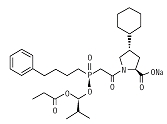Fosinopril Sodium And Hydrochlorothiazide Fosinopril Sodium 19 G, Hydrochlorothiazide 19 G while Breastfeeding

What is Fosinopril Sodium And Hydrochlorothiazide Fosinopril Sodium 19 G, Hydrochlorothiazide 19 G ?
Can I use Fosinopril Sodium And Hydrochlorothiazide Fosinopril Sodium 19 G, Hydrochlorothiazide 19 G while breastfeeding?

Nursing mothers Both fosinopril and hydrochlorothiazide are excreted in human milk. Because of the potential for serious adverse reactions in nursing infants, a decision should be made whether to discontinue nursing or to discontinue Fosinopril Sodium and Hydrochlorothiazide, taking into account the importance of the drug to the mother.
Fosinopril Sodium And Hydrochlorothiazide Fosinopril Sodium 19 G, Hydrochlorothiazide 19 G Breastfeeding Analsys
Fosinopril sodium while Breastfeeding
Low RiskCAS Number: 98048-97-6
Neonates are at a higher risk.
Hydrochlorothiazide while Breastfeeding
SafeCAS Number: 58-93-5
Thiazide diuretic drug. Excretion into breast milk is clinically non-significant. No side-effects were observed in a one-month old breastfed baby whose mother was treated with this medication. Drug level in the plasma of this child was undetectable. Long-term treatment with diuretic drugs (particularly Thiazide type ones with long-lasting effect and loop-acting mechanism) may inhibit lactation, mostly if lactation is not well-established yet. Use as lower dose as possible, especially during the first postnatal month. American Academy of Pediatrics 2013: Maternal Medication Usually Compatible With Breastfeeding. WHO Model List of Essential Drugs 2002: Compatible with breastfeeding.
Fosinopril Sodium And Hydrochlorothiazide Fosinopril Sodium 19 G, Hydrochlorothiazide 19 G Breastfeeding Analsys - 2
Fosinopril sodium while Breastfeeding
CAS Number: 98048-97-6
Because no information is available on the use of fosinopril during breastfeeding, an alternate drug may be preferred, especially while nursing a newborn or preterm infant.
Hydrochlorothiazide while Breastfeeding
CAS Number: 58-93-5
Hydrochlorothiazide doses of 50 mg daily or less are acceptable during lactation. Intense diuresis with large doses may decrease breastmilk production.

I am nursing mother and I have already used Fosinopril Sodium And Hydrochlorothiazide Fosinopril Sodium 19 G, Hydrochlorothiazide 19 G, what should I do?
Fosinopril Sodium And Hydrochlorothiazide Fosinopril Sodium 19 G, Hydrochlorothiazide 19 G is in the category of low risk, if you have already used it then its not a big deal if health and behavior of baby is good. However your health care provider shall be aware of the fact that you have used Fosinopril Sodium And Hydrochlorothiazide Fosinopril Sodium 19 G, Hydrochlorothiazide 19 G so you should inform him based on your convenience.
My doctor has prescribed me Fosinopril Sodium And Hydrochlorothiazide Fosinopril Sodium 19 G, Hydrochlorothiazide 19 G, what should I do?
Though Fosinopril Sodium And Hydrochlorothiazide Fosinopril Sodium 19 G, Hydrochlorothiazide 19 G dose not comes in category of safe drugs rather it comes in category of low risk but if your doctor is aware that you are breastfeeding your baby and has still recommended it then its advantages must be outweighing the risks.
If I am using Fosinopril Sodium And Hydrochlorothiazide Fosinopril Sodium 19 G, Hydrochlorothiazide 19 G, will my baby need extra monitoring?
Not much monitoring required while using Fosinopril Sodium And Hydrochlorothiazide Fosinopril Sodium 19 G, Hydrochlorothiazide 19 G
Who can I talk to if I have questions about usage of Fosinopril Sodium And Hydrochlorothiazide Fosinopril Sodium 19 G, Hydrochlorothiazide 19 G in breastfeeding?
US
National Womens Health and Breastfeeding Helpline: 800-994-9662 (TDD 888-220-5446) 9 a.m. and 6 p.m. ET, Monday through Friday
UK
National Breastfeeding Helpline: 0300-100-0212 9.30am to 9.30pm, daily
Association of Breastfeeding Mothers: 0300-330-5453
La Leche League: 0345-120-2918
The Breastfeeding Network supporter line in Bengali and Sylheti: 0300-456-2421
National Childbirth Trust (NCT): 0300-330-0700
Australia
National Breastfeeding Helpline: 1800-686-268 24 hours a day, 7 days a week
Canada
Telehealth Ontario for breastfeeding: 1-866-797-0000 24 hours a day, 7 days a week
